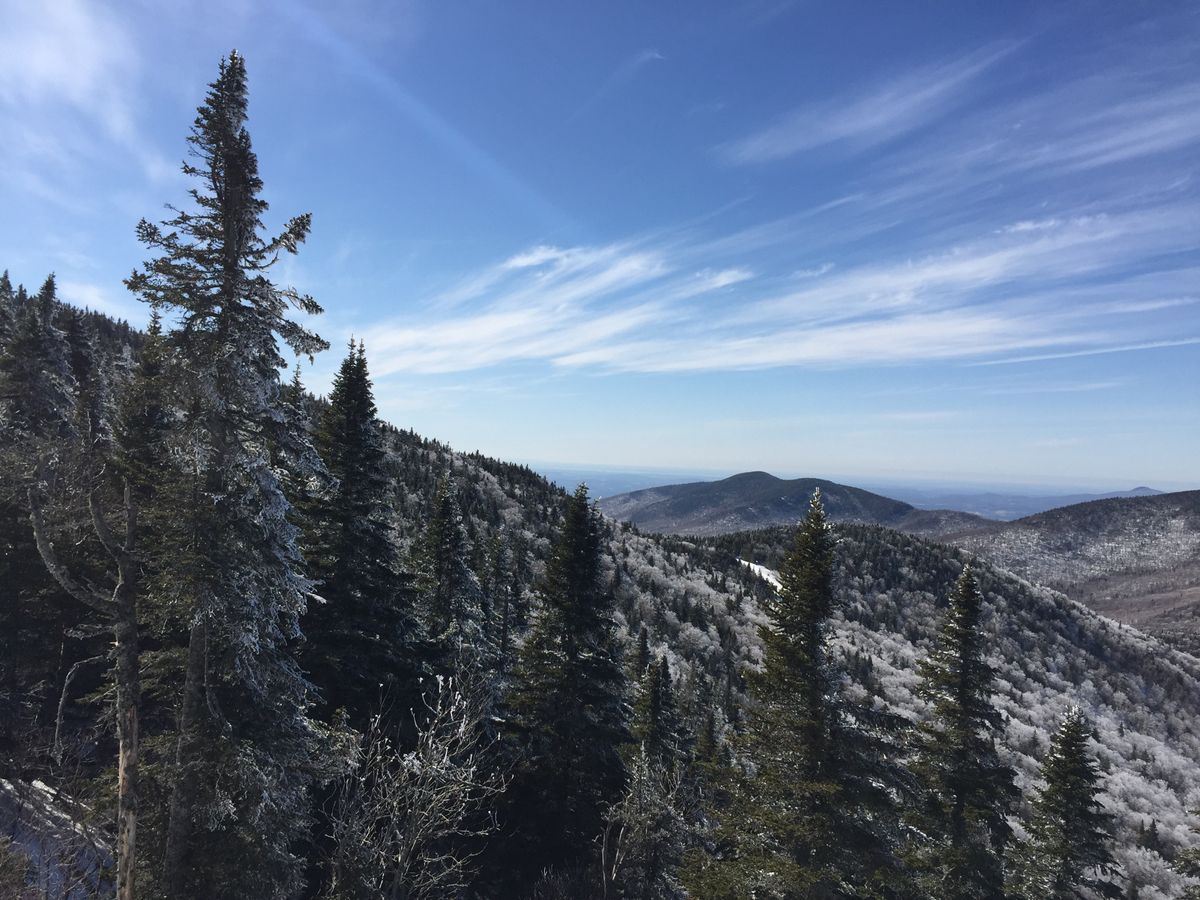Climate change and Jay Peak | Easter 2016

When you look out, over the trees covered in frost, you can almost forget that it's the end of March, that the viable ski season is almost over. I can almost forget that in 2004, I was on Orford, just thirty minutes away from Jay Peak on May Day, and the quality of the snow was much better than it was this past Easter.
It's frustrating, but remarkable, and bears noticing. It bears noticing that the mountains in the east don't have the same amount of snow as they used to. I heard, while I was on the mountain, that in 2016 Jay Peak received less than 30% of the snowfall it usually expects to receive in a given winter.
The results are obvious, even though I haven't really been on mountains on a regular basis since 2009, but climate change is here: this is just one other place where humans are being reminded of the hard limits of nature. All weekend, I was reminded me of Michio Kaku's Visions, which I read in 2000, and how it captured my imagination—in the book, Kaku predicts that humanity's trajectory is one of domination over the planet, and that our progress is one of subjugation and control:
Hence we are moving from the unraveling stage to the mastery stage in our understanding of nature. We are like aliens from outer space who land and view a chess game. It takes a long time to unravel the rules and merely knowing the rules doesn’t make one a grand master. We are like that. We have learned the rules of matter, life, and mind but are not yet their masters. Soon we will be. (From the summary of Visions from the website reasonandmeaning.com)
Predicting the future is just that: fortune telling. It's mired in our own biases and the framing of our imaginations. On the mountain, the melting snow and the dark ice underneath remind me of the tangible limits of humanity's influence. Even though humans will clear paths through the mountain and reshape hills, there's always an element of danger, of the mountain and the sun waiting for the slightest mistake.
(Sidenote: I will one day write an essay about skiing and snowboarding as microcosms of the anthroposcene. And maybe one day I will write at length about the dangers of physicists with no background in philosophy writing about the Western evolution of "human progress" like it is a universally-verifiable scientific truth.)
It's been an odd but welcome treat to get back on the mountain like this—despite an inclement sun melting what little snow is left and turning the hills into a cascading slushie.
If I could be on a mountain every weekend (every day), I would love to be. I grew up skiing, and even wanted to try my hand at racing in my early teens before growing into my shaky knees became a problem. In 2004 I picked up snowboarding and immediately fell in love. I still like to switch between snowboarding and skiing: both present different challenges getting down the mountain, and getting good at both was a goal I set for myself when I was a teenager.
I feel more like myself out there on the snow and on the ice than anywhere else.
Despite the good feels of getting out there and standing on top of a mountain, there's something I notice more now as an adult, something I saw, but didn't need to care about as much as a child. It's more than the odd glove or ski pole that fell off the chairlift and into some impossible-to-reach crevice. It's beer cans, crumpled and empty, and cigarette butts and candy wrappers, sticking out of the snow all along the side of the mountain. It's the way ski resorts have ballooned into massive hotel complexes taking over the mountain, with heated indoor waterparks open all through the winter in order to stay somewhat affloat of financial ruin.
Snowboarding and skiing, I noticed this weekend, are less about being outdoors, and more about subjugation over the outdoors. At the very least, this observation holds true in the sport-industry's current incarnation.
And it's depressing—in Vermont at least there are some environmental programs gaining traction (including a composting program at Jay Peak) but on the whole I'm left with the bitter impression that ski areas should be operating in much more environmentally sustainable and accountable ways than they are now.
Further Reading
I ended up finding many, many articles and blog posts on these topics: many which seemed legitimate, but much of it also fell into corporate feel-good green capitalism. Green capitalism "is an approach that says we can use the levers of the market to fix the broken environment—that’s its fundamental reasoning" (Source) I personally have some disagreements with the core ideals of green capitalism, but it is admittedly hard to find private and public environmental initiatives that eschew the concept completely. Below are some the links I found that look at skiing and the environment, with a particular look at Vermont and the southeast of Québec:
- August 2015—Jay Peak Fails To Meet Water Quality Targets in Settlement with State, Environmental Groups
- March 2015—Settlement reached in decade-long Jay Peak pollution claims
- August 2015—Don't mess with our mountain: Sutton residents
- September 2015—The Green Mountain State: Environmental Efforts at Vermont Ski and Ride Resorts
- KeepItWild.ca
- National Ski Areas Association (NSAA) Sustainable Slopes' Initiative
- Ski Area Pollution Prevention Handbook
- Is it possible to ski without ruining the environment?



